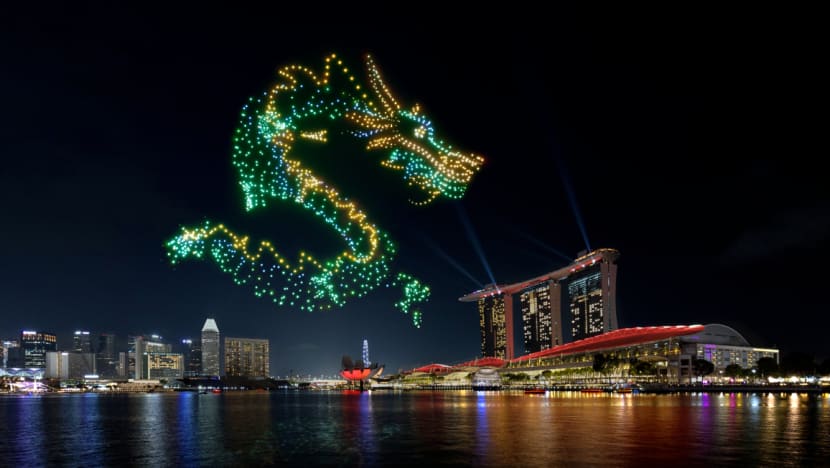NDR 2024: Singapore to review rules and processes to reduce regulatory burden for businesses
Over time, the rules have grown, and sometimes overgrown, says Prime Minister Lawrence Wong.


This audio is generated by an AI tool.
SINGAPORE: Previously, to put up a drone show in Singapore, organisers had to get a permit, register every single drone and put a sticker on each drone.
With some shows using over 1,000 drones, this meant more than 1,000 stickers and over S$25,000 (US$18,970) in compliance costs, said Prime Minister Lawrence Wong in his first National Day Rally speech on Sunday (Aug 18).
While there are valid reasons to register drones - such as for aviation security and safety - the risks are more manageable for shows held within a pre-approved area.
“So after receiving this feedback, we streamlined the process,” said Mr Wong. “Now you only need one permit for a show, regardless of how many drones you use … And no more stickers.”
A show using 1,000 drones now incurs just S$500 in compliance costs.
He was making a point on the importance of keeping the regulatory burden to a minimum and ensuring a business-friendly environment in Singapore.
Noting that more can be done in this area, Mr Wong said he has appointed Deputy Prime Minister Gan Kim Yong to oversee a “thorough and proactive review of our rules and processes, and prune them back where possible”.
Mr Wong said he also wanted to be fair to regulators doing their jobs.
“Each time an incident happens, be it an injury at a workplace, or a food poisoning outbreak, the regulators come under great pressure to tighten the rules further,” he said.
“Each new rule may seem small, but the small changes add up.”
Another example Mr Wong shared was from earlier this year, when he received feedback from a company that wanted to convert their factory into a dormitory for their workers.
They started the process in April 2023, and had to apply to seven different agencies, one by one. It was only after nine months that they got permission to proceed.
When he asking for more details about the case, Mr Wong found out that some of the delay arose because the company submitted incomplete information. But even if they had done everything properly, the application still would have taken several months.
“That’s still too long. We can and we will shorten the process,” said Mr Wong.
On the whole, Singapore's agencies understand the importance of minimising regulations, and only impose rules when necessary, said Mr Wong.
“But over time, the rules have grown, and sometimes overgrown.”
Relaxing some rules would involve, in some cases, “difficult trade-offs” and Singaporeans need to understand and support these changes, said Mr Wong.
DPM Gan has already roped in a few ministers to work on the review.
“I am sure this will improve things," said Mr Wong. "And I hope this will go some way in helping businesses, especially our small and medium enterprises.”






















